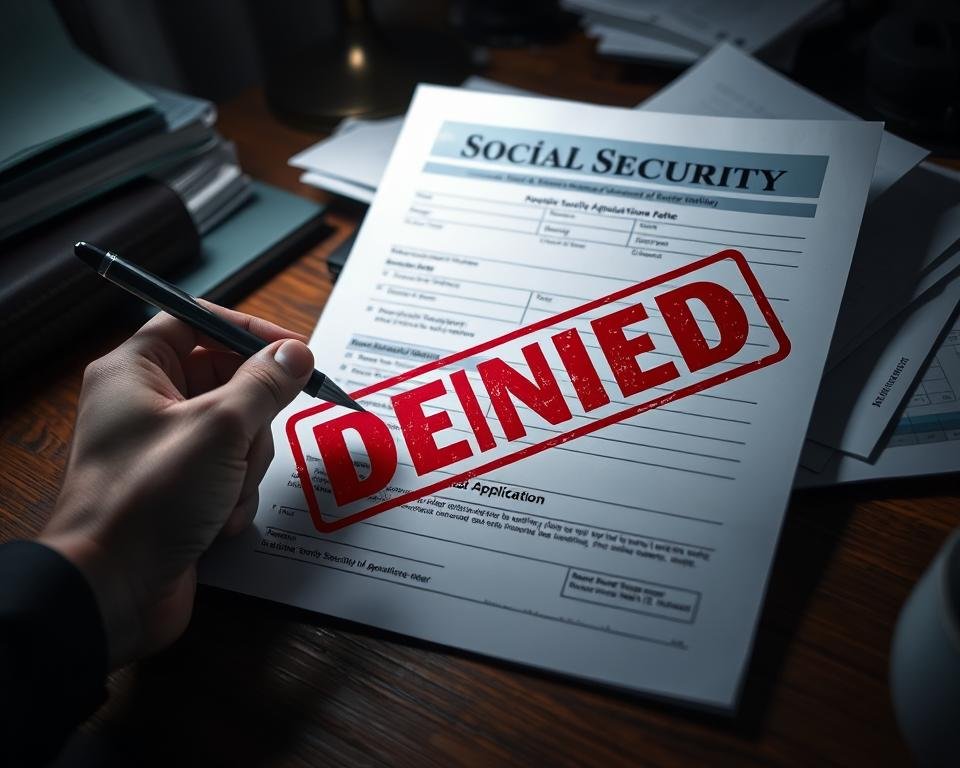About 65% of initial Social Security Disability applications don’t make the cut. This fact sheds light on the complexities that many applicants encounter. Identifying with this group means understanding you’re not in this alone. The battle isn’t over yet; there’s a strategic approach to overturning the decision and claiming the benefits you deserve.
We aim to arm you with vital steps after a social security rejection. You’ll discover reasons for application denial and how to prepare for an appeal. This guide is designed to bolster your confidence through this daunting journey. Your quest for benefits is just beginning, despite the initial setback.
Key Takeaways
- Understanding the high denial rate of Social Security Disability applications can help frame your expectations.
- Identifying common reasons for denial may allow you to address issues in your application.
- Reviewing the denial letter is crucial for recognizing your next steps.
- Gathering proper documentation is vital for a successful appeal process.
- Seeking professional help can significantly enhance your chances of overturning a denial.
- Alternative options are available, even if your social security denial appeal process is unsuccessful.
Understanding Why Your Application Was Denied
Getting denied for social security can be disappointing. Knowing why it was denied is crucial for a successful appeal. The SSA usually points out specific issues leading to a denial, emphasizing the need to fully understand your case.
Common Reasons for Denial
Many issues can cause your application to be denied. Key reasons are:
- Incomplete or missing medical records, which fail to demonstrate your condition
- Inaccurate application details that may misrepresent your situation
- Gaps in medical treatment that raise questions about the severity of your disability
These factors are essential in building a strong case, and they significantly affect the outcome of your social security denial.
Impact of Insufficient Documentation
If you lack the right documents, your approval chances drop. The SSA needs clear evidence of how your disability affects your work ability. Make sure your medical records are complete, continuous, and organized. This helps strengthen your case during the appeal.
Eligibility Criteria to Consider
Before you try again, make sure you understand the SSA’s eligibility requirements. These involve specific income thresholds and a detailed medical review. Knowing these criteria helps you find what needs improvement, improving your chances next time.

Reviewing the Denial Letter
Getting a social security denial letter is tough. It details why your application didn’t make it. To appeal successfully, understanding it is crucial. This knowledge equips you to proceed with confidence.
Key Information to Look For
Pay attention to these key points in the denial letter:
- Reasons for Denial: Grasp why your application failed.
- Your Rights: Know your appeal rights as explained in the letter.
- Contact Information: Find out who to contact with questions about the denial.
Understanding the Appeal Process
Dive into the appeal process with these steps:
- Reconsideration: Ask for another review by the SSA.
- Administrative Law Judge (ALJ) Hearing: Get a hearing for a fresh decision.
- Appeals Council Review: Request a review from the Appeals Council.
- Federal Court: Consider this final step if others don’t work out.
Time Limits for Appeals
Don’t overlook the appeal deadlines in your denial letter. You generally have 60 days from receiving the letter to appeal. Missing this timeframe could jeopardize your claim for benefits.

Preparing for the Appeal Process
Ready your appeal carefully to boost your success odds. A systematic approach is crucial for gathering needed documents. It’s vital to collect records and show your situation clearly.
Gathering Necessary Documentation
Thorough documentation is key for effective appeals. Make sure to have:
- Comprehensive medical records from all healthcare providers.
- A completed Disability Report – Appeal, providing updates about your condition.
- Any new evidence that might help strengthen your appeal.
Seeking Legal or Expert Help
Getting legal advice can greatly affect your appeal. Attorneys with social security claims expertise offer invaluable help. They guide you through the Social Security Administration intricacies and help avoid errors.
Creating a Cohesive Case Strategy
For a successful appeal, a cohesive strategy is vital. Organize your evidence to clearly show your condition’s impact on your work and daily life. This approach helps you build a compelling case how to appeal social security denial. Ensure every evidence piece bolsters your argument effectively.

Filing Your Appeal
Getting ready to challenge a social security denial requires understanding the appeal process. You can file online, by mail, or in person, depending on what suits you. The appeal type, be it a reconsideration request or a hearing before a judge, affects the outcome and duration of your case.
How to Submit Your Appeal Effectively
Submitting your appeal online via the SSA’s portal is often the quickest option. It ensures prompt delivery of documents to the relevant department. If you prefer a traditional method, mailing or faxing your appeal is also viable. Regardless of the method, adhering to deadlines is crucial.
Choosing the Right Appeal Type
Selecting the appropriate appeal type is vital. You might need a reconsideration or a hearing for a more direct argument. A reconsideration offers a new review of your case, while a hearing allows you to present your case in detail. The right choice significantly affects your appeal’s progress.
Tips for Crafting Your Appeal Letter
Your appeal letter’s details are crucial. Start by stating your disagreement and providing supporting reasons. Attach relevant documents that bolster your case. It’s imperative to file within 60 days after the denial. For thorough guidance, check out the SSA’s official page to make your appeal effective and on time.
Alternative Options After Denial
If your social security application was unsuccessful, don’t despair. There are numerous alternatives at your disposal to address and possibly ameliorate your situation. Investigating these options could lead you to the support you need.
Exploring Other Disability Programs
Many individuals fail to consider other disability programs. Both state and federal levels offer assistance for various disabilities. By researching eligibility criteria, you might find support aligned with your needs.
Reapplying for Social Security Benefits
Should you feel that circumstances have changed or previous applications were incomplete, retry applying for social security. A new submission with updated information or additional medical evidence might cast your situation in a new light.
Considering a Hearing
Opting for an appeal could lead to a hearing. Such an environment enables a more personal narrative, allowing you to articulate the extent of your disability and how it affects your life. A hearing provides an opportunity to introduce compelling evidence in support of your case.
Staying Informed and Supported
The Social Security system’s intricacies can be daunting, especially after a denial. Staying informed and finding support is crucial during this time. A variety of assistance resources are available. They can demystify the system’s rules and ensure you have the tools to advance.
Resources for Assistance
It’s beneficial to seek advice from local legal aid and specialized websites. These organizations offer crucial support for navigating Social Security. Access to these resources enhances your understanding of your rights and possible courses of action.
Joining Support Groups
Engaging with support groups can be equally important. These groups let you meet others in similar situations. You’ll find emotional support and useful advice by sharing stories and strategies. This sense of belonging can lessen isolation and boost your knowledge on handling the appeals process effectively.
Staying Updated with Social Security Policies
It’s critical to stay current with Social Security policies. Policy changes can significantly affect your case. By regularly checking for policy updates, you ensure you have the latest, most relevant information. This could be crucial for your application or appeal.
